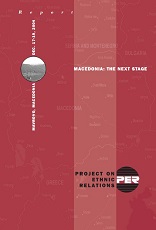Macedonia: The Next Stage
Macedonia: The Next Stage
Contributor(s): Allen H. Kassof (Editor), Livia Plaks (Editor)
Subject(s): Inter-Ethnic Relations, Ethnic Minorities Studies
Published by: PER Project on Ethnic Relations
Keywords: Ohrid agreement; Macedonia and EU; multicultural Macedonia; Mavrovo Process;
Summary/Abstract: The fourth round of discussions in the Mavrovo process was held in mid-December 2004, at a moment of great challenge for Macedonia. A new government, necessitated by the former prime minister’s resignation on November 15 and his public allegations of corruption against a government member, was confirmed by parliament on the very day the Mavrovo meeting was to convene. Nonetheless, the new prime minister and his government elected to attend the Mavrovo meetings, and use them to foster open and frank discussion among the coalition partners in the government including the parties of the smaller ethnic communities and with opposition parties. In comparison to earlier sessions of the Mavrovo process, these discussions were characterized by a significant increase in the proportion of time and attention devoted by participants to what they described as “constructive criticism” and problem-solving. Although the first session of discussions was abbreviated because of the government’s need to convene its first, organizational meeting following parliamentary confirmation, this round of the Mavrovo process covered a number of important and sensitive issues facing the new leadership team. Participants discussed their understanding of the nature of representation and accountability, from the perspective of both government and opposition. Attention was devoted to the meaning and implications of “equal representation” as a principle embedded in the Ohrid Framework Agreement and as a practical goal of government policy. There was substantial discussion of the relationship between political parties, their leaders, and the government, and its crucial effect on government authority and performance. Discussion turned several times to the importance of improving the performance of the economy for resolving social and political problems, and therefore its importance for the new government. Improving the functioning of the electoral system was the focus of a substantial amount of discussion, prompted by the upcoming local elections, scheduled for March 13, 2005. Participants put forward a number of specific issues and problems for inclusion on the government policy agenda. Participants also engaged one another in candid discussion of sensitive and contentious issues concerning the integrity of electoral processes in Macedonia. These discussions led participants to consider the adoption of a “code of conduct” to guide parties in the upcoming and future elections.
Series: PER Reports
- Page Count: 14
- Publication Year: 2004
- Language: English
- Content File-PDF

